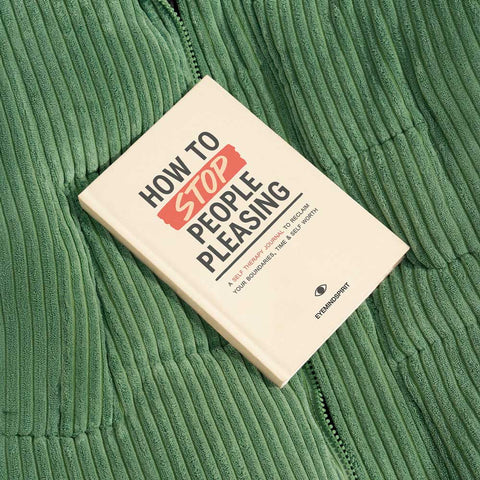People pleasing is a pattern that seems harmless at first. On the surface, it just looks like being helpful, agreeable, or easy to be around. But in reality, it’s a habit that can leave you feeling drained, resentful, and disconnected from your real self.
If you’re searching for what people pleasing really means, how to spot it, and what to do about it, you’re in the right place. Let’s break down the definition, the deeper meaning, and clear steps for breaking the cycle.
What Is People Pleasing? (Definition)
People pleasing is the habit of prioritizing other people’s needs, desires, and comfort over your own—usually out of a fear of rejection, conflict, or being disliked.
It often means saying “yes” when you want to say “no,” feeling responsible for other people’s emotions, and apologizing for things that aren’t your fault.
In psychology, people pleasing is linked to fawning, which is a survival response to keep peace and maintain connection, often learned early in life.
The True Meaning of People Pleasing
People pleasing goes deeper than just being nice. At its core, it’s about self-protection.
You might have learned, maybe as a child, that making yourself agreeable, helpful, or invisible was the safest way to avoid criticism or emotional disconnection.
Over time, people pleasing can become automatic. You say yes to things you don’t want, suppress your needs, and avoid expressing your true feelings. You start living for everyone else, losing touch with your own wants and boundaries.
Why People Become People Pleasers
People pleasing can develop for several reasons:
-
Childhood Experiences: Growing up with unpredictable, critical, or emotionally unavailable caregivers
-
Fear of Rejection: Worrying people will leave or dislike you if you show your true self
-
Low Self-Worth: Believing your value comes from being useful or agreeable
-
Cultural or Family Expectations: Being taught that keeping the peace is more important than speaking up
Signs You Might Be a People Pleaser
-
You agree to things even when you want to say no
-
You constantly worry if people are upset with you
-
You apologize often, even when it’s not your fault
-
You avoid conflict and keep your real opinions to yourself
-
You feel guilty when you prioritize your own needs
-
You feel drained, burnt out, or resentful after helping others
If these sound familiar, you’re not alone. People pleasing is incredibly common, but it doesn’t have to be permanent.
How to Stop People Pleasing
1. Notice Your Patterns
Start by bringing awareness to your automatic yeses, your urge to fix, or your anxiety about disappointing others. The more you notice, the more you can interrupt the cycle.
2. Pause Before Saying Yes
Practice pausing before agreeing to anything. Buy yourself time with phrases like, “Let me think about that,” or “I’ll get back to you.”
3. Set Small Boundaries
You don’t have to overhaul your life overnight. Start with one small “no,” or carve out a few minutes each day just for yourself.
4. Challenge the Guilt
Guilt is a natural part of change. Remind yourself that your needs matter too, and that setting boundaries is an act of self-respect, not selfishness.
5. Practice Self-Validation
You don’t need external approval to be worthy. Affirm yourself, celebrate your wins, and notice how good it feels to honor your real needs.
6. Try Journaling
Reflect on why you learned to people please and how it’s showing up in your life now. Journaling helps you break old patterns and build new ones.
Want to Go Deeper?
If you’re ready to break free from people pleasing, our How to Stop People Pleasing journal is made for you. It’s packed with prompts, exercises, and nervous system tools to help you say no without guilt, set real boundaries, and reconnect with who you actually are. This is your space to rewrite old patterns and start showing up for yourself.
Final Thoughts
People pleasing isn’t your identity. It’s a habit you learned to stay safe, but you can unlearn it and start living for yourself. Every boundary, every honest “no,” and every time you put yourself first is a step toward freedom and self-trust. You’re allowed to take up space.




